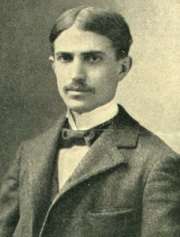Pagina: 1
A fost un ins
:
Poezie 2009-08-28 (6734 afişări)
Am văzut un om
:
Poezie 2009-08-28 (7009 afişări)
Cartea înțelepciunii
: Traducere de Leon Levițchi
Poezie 2009-08-13 (6681 afişări)
Do not weep, maiden, for war is kind
:
Poezie 2006-03-18 (7799 afişări)
Drumețul
:
Poezie 2009-08-28 (6940 afişări)
I stood upon a high place
:
Poezie 2006-03-18 (8046 afişări)
In heaven
:
Poezie 2006-03-18 (8163 afişări)
In the desert
:
Poezie 2006-03-17 (8088 afişări)
Inima
:
Poezie 2009-08-28 (7609 afişări)
Spuse îngerul...
:
Poezie 2009-08-28 (6333 afişări)
Un om văzu
:
Poezie 2009-08-28 (6632 afişări)
Pagina: 1 |
|

|
|
|
|
Biografie Stephen Crane
Stephen Crane (1871-1900), American author, whose second novel, The Red Badge Of Courage (1895), brought him international fame. The Red Badge of Courage depicted the American Civil War from the point of view of an ordinary soldier. It has been called the first modern war novel.
Crane was born in Newark, New Jersey, on November1, 1871, as the 14th child of a Methodist minister. He started to write stories at the age of eight and at 16 he was writing articles for the New York Tribune. Crane studied at Lafayette College and Syracuse University. After his mother's death in 1890 - his father had died earlier - Crane moved to New York, where he lived a bohemian life, and worked as a free-lance writer and journalist. While supporting himself by his writings, he lived among the poor in the Bowery slums to research his first novel. Crane's first novel, Maggie: A Girl Of The Streets(1893) was a milestone in the development of literary naturalism. Crane had to print the book at his own expense, borrowing the money from his brother.
Crane's collection of poems, The Black Rider, also appeared in 1895 These books brought Crane better reporting assignments and he sought experiences as a war correspondent in combat areas. Crane traveled to Greece, Cuba, Texas and Mexico, reporting mostly on war events. His short story, "The Open Boat," is based on a true experience, when his ship sank on the journey to Cuba in 1896. With a small party of other passengers, Crane spent several days drifting in an open boat before being rescued. This experience impaired his health permanently.
In 1898 Crane settled in Sussex, England, where he became friends with Joseph Conrad, H.G. Wells, and Henry James. During these restless years Crane refined his use of realism to expose social ills, as in George's Mother (1896), which explored life in the Bowery. In 1899 appeared Active Service, which was based on the Greco-Turkish War.
In 1899 Crane returned to Cuba, to cover the Spanish-American War. Due to poor health he was obliged to return to England. Crane died on June 5, 1900 at Badenweiler in Germany of tuberculosis, which was worsened by malarial fever he had caught in Cuba.
Crane's posthumous publications include the sketches and stories from his life as a correspondent in Wounds In The Rain (1900) and Whilomville Stories (1900), depicting a childhood in a small state. Crane's works introduced into American literature realism, although his innovations in technique and style and use of symbolism gave much of his best work a romantic rather than a naturalistic quality.
|





